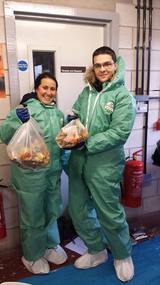News > 'Eat Waste' Say SMART Researchers

The Centre for SMART is part of a new £0.8 million research project examining how food waste can be turned into edible products.
The two-year project, which received funding from the Engineering and Physical Sciences Research Council (EPSRC), is a joint collaboration between Loughborough University and the universities of York and Nottingham. It will explore how systems can be improved to better utilise unavoidable food supply chain wastes (UFSCW) as a bio-resource, including reusing the nutritional content within food waste to make products suitable for human consumption.
Food and drink is the largest manufacturing sector in the UK, employing approximately 400,000 people with a turnover of £76 billion. A staggering 9.9 million tonnes of food waste and food by-products are generated per year in the food industry alone, of which 56 per cent is considered unavoidable.
Food which is lost after harvest and along the distribution and consumption chain has a negative environmental impact, putting pressure on natural resources and ecosystems and causing pollution through food discards. Current strategies for dealing with UFSCW are rudimentary and of low value: these include incineration and where possible; animal feed and bedding; compositing; ploughing back in to soil and sometimes landfill.
Professor Shahin Rahimifard, Director of the Centre for SMART, says: “This is very exciting research which could see for the first time the creation of new food products for human consumption by upgrading the nutritional content in food waste, and could have a significant impact on global food security.”
The results from the project will be assessed at an industry level to determine any possible consequences for the entire UK food manufacturing sector.